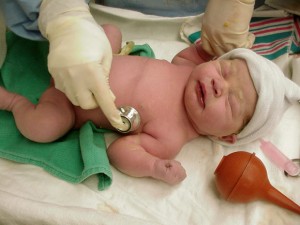Legislation has recently been introduced in the New Jersey Legislature that would allow for the issuance of Restraining Orders in Non-Domestic Violence situations. While its passage and/or application to family law matters is problematic, this led me to think about a question frequently posed by many of my divorce clients – short of someone being found guilty of committing an act of Domestic Violence, “Is there any way of forcing my (bleep) spouse out of the marital residence until such time we are divorced?”. Most of the time my answer would be, “Unfortunately, no” . Would this proposed legislation change that answer, or is it time for the courts to revisit how they address these situations? Continue reading ›
Articles Posted in Other Family Actions
New Jersey Governor Signs a New Law Allowing Adoptees More Information About Their Biological Families
For more than three decades a debate has been waged in New Jersey on the adoption front over the extent to which adoptees can access their birth records and uncover information about their biological parents. In 1940, New Jersey began sealing adoption records. In 1977, New Jersey allowed the records to be accessible by court order. N.J.S.A. 9:3-51. Anti-abortion/pro-life activists advocated for birth records to be sealed because birth mothers who wished for anonymity might be more inclined to have an abortion if her privacy were not protected, or birth mothers might be more inclined to use New Jersey’s Safe Haven Infant Protection law that allows a newborn who is less than thirty days old to be left legally and anonymously at a police station or hospital emergency room without having to give any identifying or health information about the birth mother. Continue reading ›
Does a New Jersey Court Have to Provide Counsel and Experts to Litigants Who Do Not Pay Court Ordered Support Before Incarcerating Them?
Most times, when courts award alimony and child support the Payors comply with their court ordered support obligations. In some instances, unfortunately, compliance with such orders wains and the issue of enforcement of court ordered support obligations must be addressed by the Court. New Jersey Court Rule 1:10-3 provides a vehicle for the Payee to seek enforcement of support orders through an application for the “Enforcement of Litigant’s Rights” and provides a plethora of coercive vehicles to a court to compel compliance with court ordered support obligations. Clearly the most effective of these coercive vehicles is the ability to incarcerate the payor until compliance in the form of payment is forth coming. Continue reading ›
New Jersey Appellate Division Case Upholding Award of Negligent Infliction of Emotional Stress Damages Illustrative As to the Issue of Marital Torts
In the landmark case of Merenoff v. Merenoff, 76 N.J. 535 (1978), the New Jersey Supreme Court overturned the doctrine of interspousal immunity, which prevented one from suing one’s spouse for injuries proximately caused by the conduct of that spouse. Later, in the case of Tevis v. Tevis, 79 N.J. 422,(1979), the Supreme Court held that “that the abolition of the doctrine [of interspousal immunity] pertained to tortious conduct generally encompassing not only conventional negligence but also intentional acts, as well as other forms of intentional behavior such as gross negligence, recklessness, wantonness, and the like.” The law on interspousal torts further was developed in the case of Giovine v. Giovine, 284 N.J.Super. 3, 13 (App.Div. 1995), where the Appellate Division recognized the right of a spouse to sue the other spouse under the tort of intentional infliction of emotional distress where the measure of damages was not dependent upon physical injury to the plaintiff, but could be established through competent evidence showing the perpetrator’s’s outrageous or otherwise actionable conduct. Continue reading ›
New Jersey Court Allows a Mother to Bar the Child’s Putative Father From the Delivery Room
 In a November, 2013 decision published on March 10th of this year, in what appears to be the first decision of its kind not only in New Jersey but in the United States, a Superior Court judge in the matter of Plotnick v. Delucca held that an expectant mother is not required to notify the child’s father when she goes into labor, nor is she required to allow him into the delivery room to witness the child’s birth. Continue reading ›
In a November, 2013 decision published on March 10th of this year, in what appears to be the first decision of its kind not only in New Jersey but in the United States, a Superior Court judge in the matter of Plotnick v. Delucca held that an expectant mother is not required to notify the child’s father when she goes into labor, nor is she required to allow him into the delivery room to witness the child’s birth. Continue reading ›
The Rachel Canning Case: Can Married Parents Be Forced to Pay College Expenses the Way that Divorced Parents May Be Obligated?
United States Supreme Court Justice Sandra Day O’Connor wrote on behalf of the Court in the case of Troxel v. Granville, 530 U.S. 57 (2000), that “the interest of parents in the care, custody, and control of their children — is perhaps the oldest of the fundamental liberty interests recognized by this Court.” Justice O’Connor went on to cite other decisions like Meyer v. Nebraska, 262 U.S. 390 (1923), wherein the Court recognized “that the ‘liberty’ protected by the Due Process Clause includes the right of parents to ‘establish a home and bring up children’ and ‘to control the education of their own.’” Continue reading ›
custody, and control of their children — is perhaps the oldest of the fundamental liberty interests recognized by this Court.” Justice O’Connor went on to cite other decisions like Meyer v. Nebraska, 262 U.S. 390 (1923), wherein the Court recognized “that the ‘liberty’ protected by the Due Process Clause includes the right of parents to ‘establish a home and bring up children’ and ‘to control the education of their own.’” Continue reading ›
Further Discussion Regarding Grandparent Visitation in New Jersey
Prophetically, Karen Willitts in her blog on January 3, 2014 entitled “Grandparent Visitation in New Jersey”, discussed the state of our law as it relates to the rights of grandparents to seek visitation with their grandchildren pursuant to New Jersey statute, N.J.S.A. 9:2-7.1. Continue reading ›
grandchildren pursuant to New Jersey statute, N.J.S.A. 9:2-7.1. Continue reading ›
Not So Fast: The Obituary of Palimony’s Demise May Be Premature
Only several months ago I wrote a blog discussing the then state-of-the-law in New Jersey in regards to palimony and the ability of unmarried cohabitants to enforce unwritten promises of support. Continue reading ›
To Divorce or Not to Divorce: Mid-Marriage Agreements May Answer The Question
One of the more confounding issues facing people on the brink of divorce is the wisdom of pulling back and giving an unhealthy but possibly salvageable marriage a second chance. The uncertainty may be the concern of one or both partners. It may related to the catalyst for the divorce decision or concerns about trying again when substantial resources may have already been expended getting ready for the divorce. Continue reading ›
Engagement Rings: Conditional Gifts and the Family Court
 As a divorce attorney, I deal primarily with the ending of marital relationships some time subsequent to the marriage. However, it is not uncommon for parties that are engaged to marry one another, fully intending on getting married, to have second thoughts and decide to call it off for any number of reasons. Continue reading ›
As a divorce attorney, I deal primarily with the ending of marital relationships some time subsequent to the marriage. However, it is not uncommon for parties that are engaged to marry one another, fully intending on getting married, to have second thoughts and decide to call it off for any number of reasons. Continue reading ›
 New Jersey Divorce and Family Lawyer Blog
New Jersey Divorce and Family Lawyer Blog

